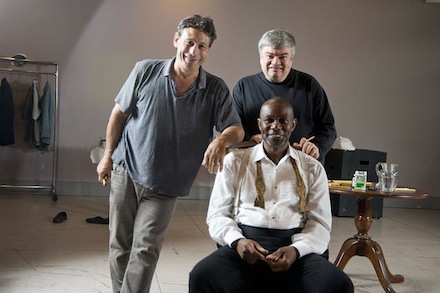If you live in New York and feel the irresistible urge to see me hold forth in person on Wednesday night, I’m participating in a panel discussion called “Writing and the Digital Revolution” that will be moderated by my old friend Alane Salierno Mason, an executive editor at W.W. Norton.
Alane and I both live in Manhattan’s Washington Heights, as do Meena Alexander, Brenda Copeland, Jim Dwyer, Dorian Karchmar, Veronica Liu, and Clive Priddle, the other panelists, and that’s where the discussion is taking place. We’ll be performing from six to eight p.m. at PS/IS 187, which is at 349 Cabrini Blvd. between 187th and 190th Streets. (Take the A train to 190th Street and you’re steps away.)
Admission is $40, but students will be admitted free. For more information, go here.
Archives for May 28, 2013
TT: I rejoice to report…
 …that Long Wharf Theatre‘s 2012 production of Satchmo at the Waldorf, my first play, has been nominated by the Connecticut Critics Circle for two awards. John Douglas Thompson, the star, was nominated as Outstanding Leading Actor in a Play, and Gordon Edelstein, who staged Satchmo, was nominated as Outstanding Director of a Play. This is, needless to say, a new experience for me, and I couldn’t be more pleased for my eminently deserving colleagues.
…that Long Wharf Theatre‘s 2012 production of Satchmo at the Waldorf, my first play, has been nominated by the Connecticut Critics Circle for two awards. John Douglas Thompson, the star, was nominated as Outstanding Leading Actor in a Play, and Gordon Edelstein, who staged Satchmo, was nominated as Outstanding Director of a Play. This is, needless to say, a new experience for me, and I couldn’t be more pleased for my eminently deserving colleagues.
The winners will be announced in New Haven on June 10. For a complete list of nominees and information about the award ceremony, go here.
TT: Lookback
From 2003:
The “untheatricality” of rock music is a complicated subject about which I’ve never gotten around to writing. It’s far too complicated to go into in a short posting, but I can say that to blame the decline of the Broadway musical on rock is to mistake a symptom for the disease. What happened in the Sixties was that the old-fashioned standard-style ballad ceased to be the lingua franca of American popular music–and that nothing replaced it. Instead, our musical tastes shattered into a million pieces….
Read the whole thing here.
TT: Almanac
“Klopstock was questioned regarding the meaning of a passage in his poem. He replied, ‘God and I both knew what it meant once; now God alone knows.'”
Cesare Lombroso, The Man of Genius
